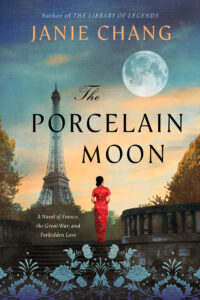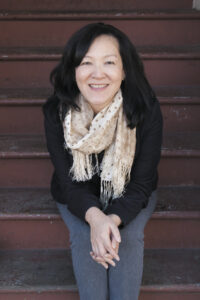Recreating the Day-to-Day Instead of Air-brushing History: The Porcelain Moon by Janie Chang
 BY CLARE RHODEN
BY CLARE RHODEN
Janie Chang’s novel The Porcelain Moon (William Morrow, 2023) uncovers some little-remembered aspects of the Great War, introducing the reader to the complex history of Chinese emigrants in France. Focussing on a cast of engaging, accessible characters, Chang sets out to recreate the daily lives of everyday people.
“I like to begin by establishing the ordinary, which turns out to be the most difficult part of historical research,” she explains. “Dates of battles and names of generals are easy, but what kind of wild food did people forage for during rationing, how long did it take to send a letter from one Paris address to another, what sort of wages did female factory workers receive compared to male workers and what did butter cost?”
These are the everyday matters that underlie the story. When war disrupts the ordinary, significant changes are at hand.
The main protagonists of The Porcelain Moon are Pauline, a Chinese woman desperate to stay in France to avoid an arranged marriage, and Camille, an unhappily married Frenchwoman who falls in love with Theo—Pauline’s brother. Theo is a Chinese interpreter whose role is to relay commands from the French army to the Chines workers. It is through the women’s experiences that we see the effects of war, not on the soldiers but also for wider society at all levels.
“It’s critical to first understand the conventions circumscribing the women: legal, religious, and social,” says Chang. Then she asked herself how plausible it would it be for Pauline and Camille to go completely outside those conventions. “I learned that some Chinese workers stayed behind and married Frenchwomen,” she explains. “This gave me permission to include such a romance in the novel.”
Chang’s research also showed that mixed-race marriages, while legal in France, were regarded suspiciously. “Layer on top of that racism against Chinese workers, an abusive husband, and the ticking clock of the Armistice, and you have a character whose life decisions really haven’t been her own, and who must now risk her own safety to escape a life-threatening situation.”
One challenging aspect of writing historical fiction is resisting the urge to make female characters think and act like 21st-century women. “I think of Camille and Pauline as being driven by desperation to act as they do, going outside the norms of what their families and society demand and leveraging what they can… It’s my job as the writer to help readers understand how difficult these decisions are and what the women are risking.”

author photo by Ayelet Tsabari
Many of Chang’s novels are set in 1930s China. The Porcelain Moon takes place mostly in France, but similar themes of social transition arise. It was while researching another book that Chang discovered an article about the city of Liverpool dedicating a memorial to the Chinese Labour Corps of World War I. “It just floored me because I’d never heard of them. When you’re a history nerd, you dive down that rabbit hole of research and what I learned left me astonished and outraged that so many men could’ve been airbrushed out of history. I wanted to give them recognition for the role they played in helping the Allies win the Great War and in doing so, give readers a more complete picture of that chapter in history.”
The Porcelain Moon also resonates with depth in the way that the women’s experiences connect with the legendary Moon Lady Chang’e. Janie Chang recognises the universality of women’s experiences and the role of folklore.
“Myths and fairy tales endure because they address deep-rooted yearnings or terrors; family dynamics are so often at the heart of myths, regardless of their origins,” she says. “Folklore and legends tend to make their way into my novels. It’s hardly ever deliberate at the beginning, it just happens.”
With a deep appreciation of the history and a compassionate understanding of her characters’ motivations and choices, Chang’s Great War novel paints details into an overlooked background.
About the contributor: Clare Rhoden is a writer and reviewer from Melbourne Australia. Her PhD investigated Australian literature of the Great War. Her latest novel combines family adventure with magic cats.






